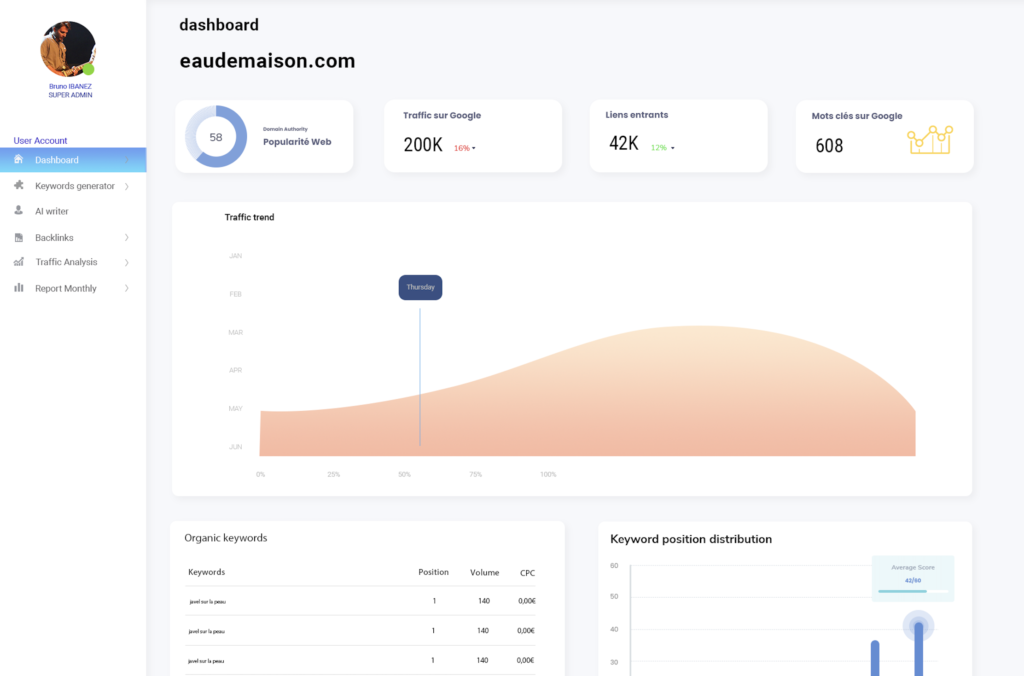

Keyword cannibalization is a common issue in the field of organic SEO. It can occur when multiple pages on your website try to rank for the same keywords, creating internal competition that may harm your overall ranking in search results. But how can you avoid this phenomenon? Follow the guide.
Table of Contents
ToggleTo start, it is essential to understand what keyword cannibalization is. In simple terms, it’s when multiple of your web pages target the same keyword or phrase. As a result, instead of helping your site rank higher in search results, they compete for the same audience.
Keyword cannibalization can affect your organic SEO strategy in several ways. First, it dilutes the relevance of your content by spreading your page’s authority across multiple URLs. Second, it can confuse search engines about which page to index for a specific keyword.
It can result in a poor user experience by directing visitors to irrelevant content.
Before venturing any further, it is of utmost importance to deeply understand what keyword cannibalization implies. In the simplest of terms, this concept refers to a situation where multiple pages on your website are targeting the same keyword or phrase. The end result is not as beneficial as one might intuitively think. Rather than aiding your website to ascend in search engine results, these pages wind up in competition with one another, all vying for the same audience’s attention.
Exploring the intricacies of keyword cannibalization reveals a number of ways in which it can potentially jeopardize your organic SEO strategy. To begin with, it dilutes the relevance of your content. This dilution happens as your page’s authority is dispersed across numerous URLs instead of being concentrated in a singular, effective place. This scattering weakens the overall impact your content could have had if it were more centralized.
In addition, keyword cannibalization can cause a level of confusion for search engines. They may find it challenging to determine which of your multiple pages, all aiming at the same keyword, should be indexed for that specific keyword. This confusion not only undermines the effectiveness of search engines, but it can also prevent your most relevant content from being prominently displayed in search results.
Lastly, and perhaps most critically from a user perspective, keyword cannibalization can lead to a subpar user experience. This occurs when visitors are directed to content that is irrelevant or not as pertinent to their search as other content on your site. The frustration this can cause for users could result in decreased time spent on your site, lower conversion rates, and a negative perception of your site’s utility.
Given these potential ramifications, it becomes clear that understanding and addressing keyword cannibalization is not a mere technical detail. Rather, it is a fundamental aspect of a robust and effective SEO strategy. By properly managing keywords across your site, you can help ensure not only higher search rankings, but also a more positive and beneficial user experience.
Now that we have a clear understanding of what it is, how can you identify it on your website? Here are some steps to follow.
The first step to identifying keyword cannibalization is to conduct a content audit. This means you must review all the pages on your site and take note of the keywords each one targets. This can be a tedious task, but it’s crucial for identifying keyword duplicates.
There are several SEO tools on the market that can help you identify keyword cannibalization. These tools can analyze your site and alert you when multiple pages target the same keyword.
Once you’ve identified which articles are affected on your site, you can start working on solutions to address this issue. We will discuss these solutions in the next part of this article.
In summary, it can harm your ranking in search results and the user experience on your site. However, by understanding what it is and learning to identify it, you can take steps to avoid this problem and optimize your organic SEO strategy.
With a clear idea of its effects and how to detect it, let’s look at different strategies you can adopt to resolve and prevent this issue. To improve your organic SEO, consider these tactics.
One of the most effective strategies to avoid keyword cannibalization is to ensure each page on your site targets a unique set of keywords. While this might seem obvious, it’s a common mistake that many sites make. By ensuring that each page on your site has its own purpose in terms of keywords, you can minimize the risk of cannibalization.
Another strategy to avoid it is to use canonical tags. Canonical tags tell search engines which version of a page is the “main” one. This can be particularly useful if you have multiple pages with similar content. By using a canonical tag, you can tell search engines which page they should index and rank for a specific keyword.
If there are multiple pages on your site targeting the same keyword, it may be beneficial to consolidate this content into one page. By consolidating your content, you can avoid competition between your own pages and concentrate all of your page’s authority on a single URL.
Often, keyword cannibalization can be the result of poor site organization. It is essential to structure your site so that each page has a clear purpose and a unique set of keywords. This may involve reorganizing your navigation, revising your site architecture, and rethinking how you create and categorize your content.
Avoiding keyword cannibalization can seem like a daunting task, especially if you’re new to SEO. This is where an SEO agency can prove invaluable.
An SEO agency can help you navigate the complexities of SEO. They have the expertise needed to perform a site audit, identify issues, and devise a strategy to solve them. In addition, they can provide advice on how to structure your site and target your keywords to optimize your organic SEO.
In conclusion, keyword cannibalization is a common problem that can harm your ranking in search results. However, by taking steps to avoid it and working with an SEO agency, you can optimize your site for search engines and improve your online visibility.
After implementing strategies to avoid keyword cannibalization, it’s crucial to continue monitoring your site to ensure this problem doesn’t resurface. Continuous optimization of your site is key to successful organic SEO.
It’s important to regularly track your keywords and the pages that target them. This will help you detect any potential keyword cannibalization issues before they become a major problem. Tools like Google Search Console can be helpful for this tracking.
In addition to tracking your keywords, you should also regularly review your site structure. Ensure that each page has a clear purpose and targets a unique set of keywords. If you regularly add new pages to your site, it’s especially important to continue monitoring your site structure to avoid keyword cannibalization.
Another way to monitor and maintain the absence of keyword cannibalization is to work with a web SEO agency. These SEO experts can monitor your site for potential issues, assist you in resolving them, and provide advice to prevent future keyword cannibalization.
By working with a web SEO agency, you can ensure that your site is always optimized for search engines and that you’re not competing with yourself for search engine rankings.
Keyword cannibalization is a common problem that can harm your organic SEO. However, by understanding what keyword cannibalization is, how to detect it, and how to avoid it, you can improve your site’s performance in search results. And by working with a web SEO agency, you can ensure that your site is always optimized to avoid keyword cannibalization. Remember that SEO is a continuous effort, and it’s essential to constantly monitor and adjust your strategy for success.

Do you have a strategy for climbing the Google rankings?
Gain positions and qualified traffic with SEO

SEO Writer - CEO @hacktheseo
An expert in SEO since the launch of his e-commerce dedicated SAAS in 2016, Eric quickly grasped the significance of optimization for search engines to acquire new clients. Building on this expertise, he authored a book in 2019, published by Dunod, providing invaluable insights for succeeding in the e-commerce world. Recently, Eric introduced an innovative SAAS, leveraging artificial intelligence to assist entrepreneurs in enhancing their visibility on Google through simplified SEO.
How useful was this post?
Click on a star to rate it!
Average rating / 5. Vote count:
No votes so far! Be the first to rate this post.
Hack The SEO positions itself as a non-traditional marketing agency.
© 2024 Hack The SEO. All rights reserved.

Boost your visibility on Google with AI.
Reserved for the first 50!
Adding {{itemName}} to cart
Added {{itemName}} to cart